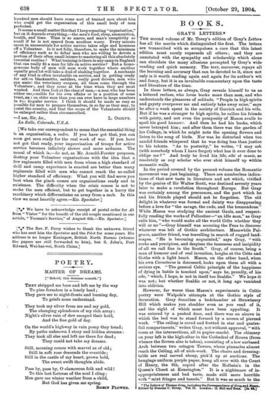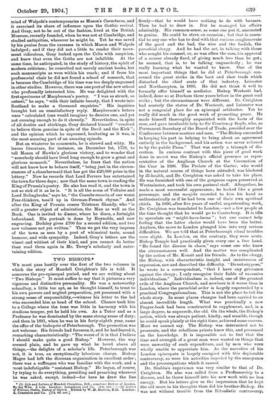THE second volume of Mr. Tovey's edition of Gray's Letters
has all the merits which distinguished the first. The letters are transcribed with so scrupulous a care that this latest edition must surely supersede all others ; and they are annotated with the sympathy and scholarship which alone can elucidate the many allusions prompted by Gray's wide reading and quick memory. The text, moreover, repays all the learning and accuracy that can be devoted to it, since not only is it worth reading again and again for its author's wit and fancy, but it is an invaluable commentary upon the taste and literature of the time.
In these letters, as always, Gray reveals himself to us as a lettered recluse, who loves books more than men, and who understands the pleasures of solitude. "People in high spirits and gayety overpower me and entirely take away mine," says he after a week spent in the society of Garrick and his wife. But if he was a stranger to high spirits, he rallies his friends with gaiety, and not even the pomposity of Mason avails to spoil his good humour. And then he had his books, which never betrayed him ; and after them there was the garden of his College, in which he might note the opening flowers and listen to the song of birds. Nor was he disturbed when too candid friends whispered that he was doing less than justice to his talents. "As to posterity," he writes, "I may ask (with somebody whom I have forgot) what has it ever done to oblige me ? " And truly he lived his life, sibi et ntusis, as resolutely as any scholar who ever shut himself up within monastic walls.
In the period covered by the present volume the Romantic movement was just beginning. There are numberless indica- tions of that new taste in literature and art which, vivified by the genius of Sir Walter Scott, was destined seventy years later to make a revolution throughout Europe. But Gray was certainly among the precursors, and the part which he and his friends played should not be forgotten. The old delight in whatever was formal and dainty was disappearing before a love for " the savage, the rude, and the tremendous." While Mason was studying the ancient Gauls, and respect- fully reading the works of Pelloutier—" an idle man," as Gray calls him, "who would make all the world Celts whether they will or no "—Gray himself was scouring the Fens to discover whatever was left of Gothic architecture. Meanwhile Pal- grave, another friend, was travelling in search of rugged land- scapes. " He is becoming acquainted," says Gray, " with rocks and precipices, and despises the tameness and insipidity of all we call fine in the South." Gray, of course, being a man of humour and of real invention, laughs at the Celts and Goths with a light heart. Mason, on the other hand, when his own Caractacus is discussed, looks upon them all with a serious eye. " The general Celtic principle of the happiness of dying in battle is touched upon," says he, proudly, of his ode, " which, I hope, is not in itself too Scaldic." We hope it was not ; but whether Scaldic or not, it long ago vanished into oblivion.
However, far worse than Mason's experiments in Celtic poetry were Walpole's attempts at the Gothic style of decoration. Gray describes a bedchamber at Strawberry Hill which makes you shudder even as you read of it, and the sight of which must have been appalling. It was entered by a peaked door, and there was an alcove in which the bed was to stand formed by a screen of pierced work. "The ceiling is coved and fretted in star and quatre- foil compartments," writes Gray, not without approval, " with roses at the intersections, all in papier-mache. The chimney on your left is the high-altar in the Cathedral of Rouen (from whence the Screen also is taken), consisting of a low surbased Arch between two octagon Towers, whose pinnacles almost reach the Ceiling, all of nich-work. The chairs and dressing- table are real carved ebony, pick'd up at auctions. The hangings uniform purple paper, hung all over with the Court of Henry, the 8th, copied after the Holbein's in the Queen's Closet at Kensington." It is a nightmare of in- appropriateness and bad taste, made still more horrible with " mixt fringes and tassels." But it was as much to the • The Letters of Thomas Gray. includiwy ths Cormspondoacs of Gray...ad Mom. Edited by Duncan C. Tovey. Vol. H. London : G. Bell and Sons. [Ss. Ida mind of Walpole's contemporaries as Mason's Caractacus, and it exercised its share of influence upon the Gothic revival. And Gray, not to be out of the fashion, lived at the British Museum, recently founded, when he was not at Cambridge, and studied antiquities, wherever he might be. Yet he was saved by his genius from the excesses in which Mason and Walpole indulged ; and if they did not a. little to render their move- ment ridiculous, Gray looked upon the Celts with suspicion, and knew that even the Goths are not infallible. At the same time, he anticipated, in the study of history, the spirit of modern criticism ; he consulted not merely ancient books, but such manuscripts as were within his reach ; and if from his professorial chair he did not found a school of research, that is because the Cambridge of his time was too deeply engrossed in other studies. However, there was one poet of the new school who profoundly interested him. He was delighted with the first specimens of Macpherson's poetry. " I was so struck, so eztasie," he says, " with their infinite beauty, that I wrote into Scotland to make a thousand enquiries." His inquiries brought but an unsatisfactory reply. Macpherson's letters were " calculated (one would imagine) to deceive one, and yet not cunning enough to do it cleverly." Nevertheless, in spite of all doubts and shirkings, Gray declared himself " resolved to believe them genuine in spite of the Devil and the Kirk "; and the opinion which be expressed, hesitating as it was, is the most amazing part of an amazing episode.
But on whatever he comments, he is shrewd and witty. He leaves literature, for instance, on December let, 1759, to tell Mason of Hawke's glorious victory, and to wonder that " somebody should have lived long enough to grow a great and glorious monarch." Nevertheless, he fears that the nation will not know how to behave itself, " being just in the circum- stances of a chambermaid that has got the £20,000 prize in the lottery." Now he records that Lord Ferrers has entertained the town for three days ; now that the same town is reading the King of Prussia's poetry. He also has read it, and the town is not so sick of it as he is. " It is all the scum of Voltaire and Lord Bolingbroke," says he, " the Crambe recocta of our worst Free-thinkers, toss'd up in German-French rhyme." And after the King of Prussia comes Tristram Shandy, who "is still a greater object of admiration, the Man as well as the Book. One is invited to dinner, where he dines, a fortnight beforehand. His portrait is done by Reynolds, and now engraving. Dodsley gives £700 for a second edition, and two new volumes not yet written." Thus we get the very impress of the town as seen by a poet of whimsical taste, sound humour, and wide sympathy. Indeed, Gray's letters are the wisest and wittiest of their kind, and you cannot do better than read them again in Mr. Tovey's scholarly and enter- taining edition.



















































 Previous page
Previous page